Unit 4 Pygmalion Learning about Language课件(42张)
文档属性
| 名称 | Unit 4 Pygmalion Learning about Language课件(42张) | 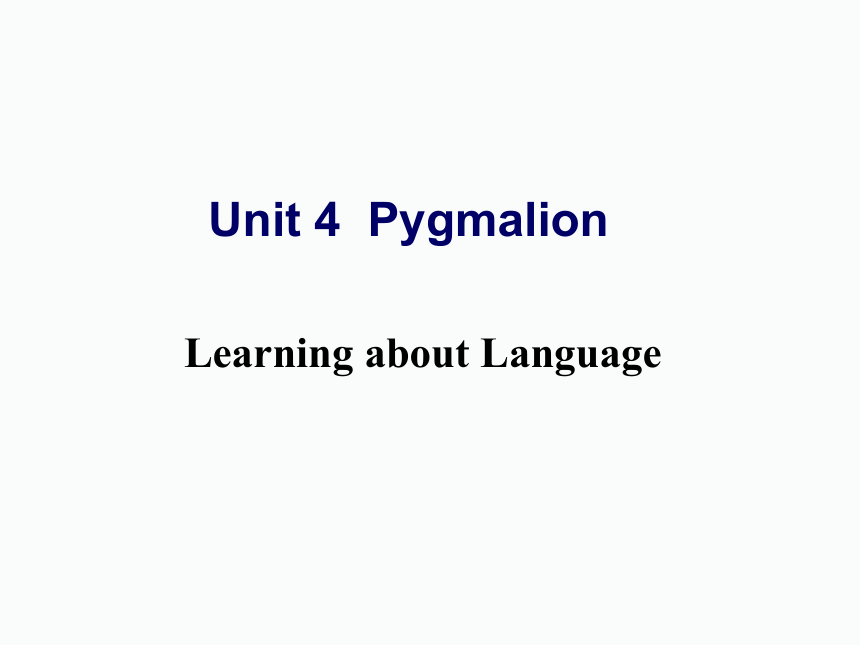 | |
| 格式 | zip | ||
| 文件大小 | 84.8KB | ||
| 资源类型 | 教案 | ||
| 版本资源 | 人教版(新课程标准) | ||
| 科目 | 英语 | ||
| 更新时间 | 2018-07-28 19:37:21 | ||
图片预览

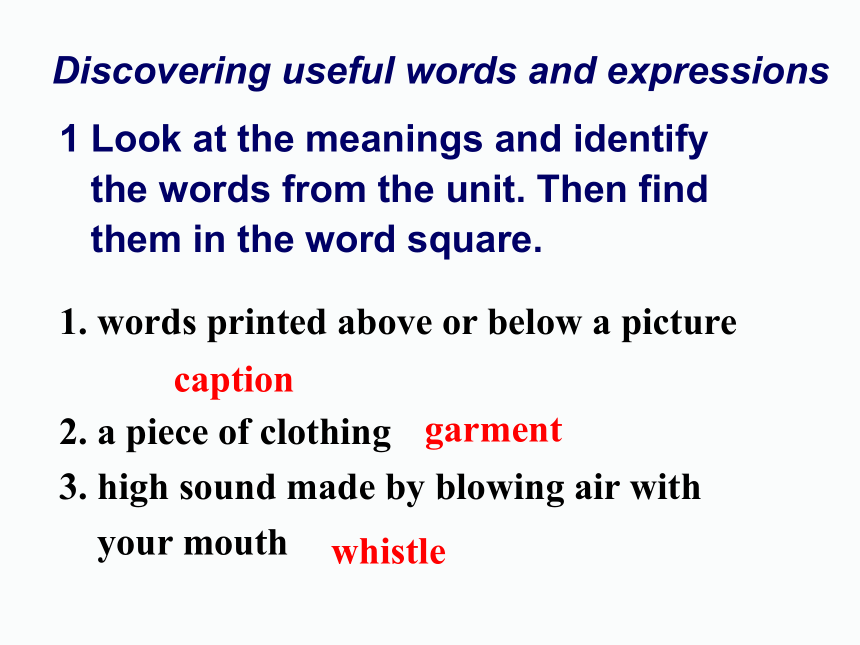
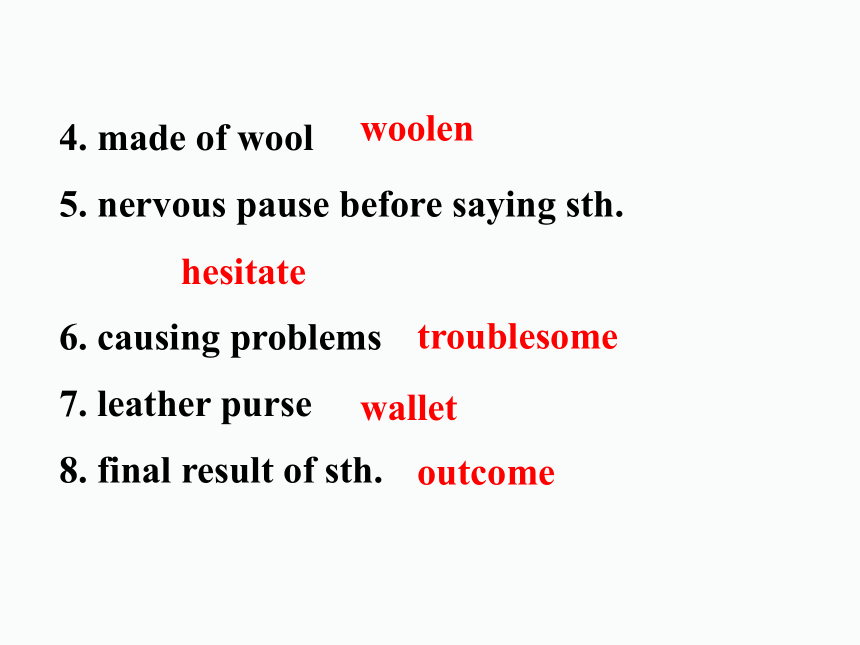
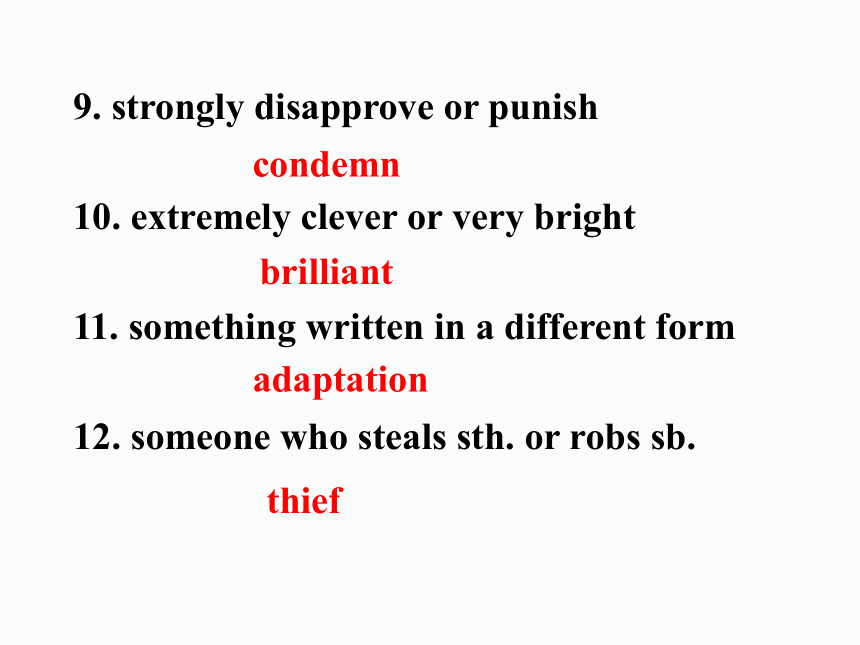
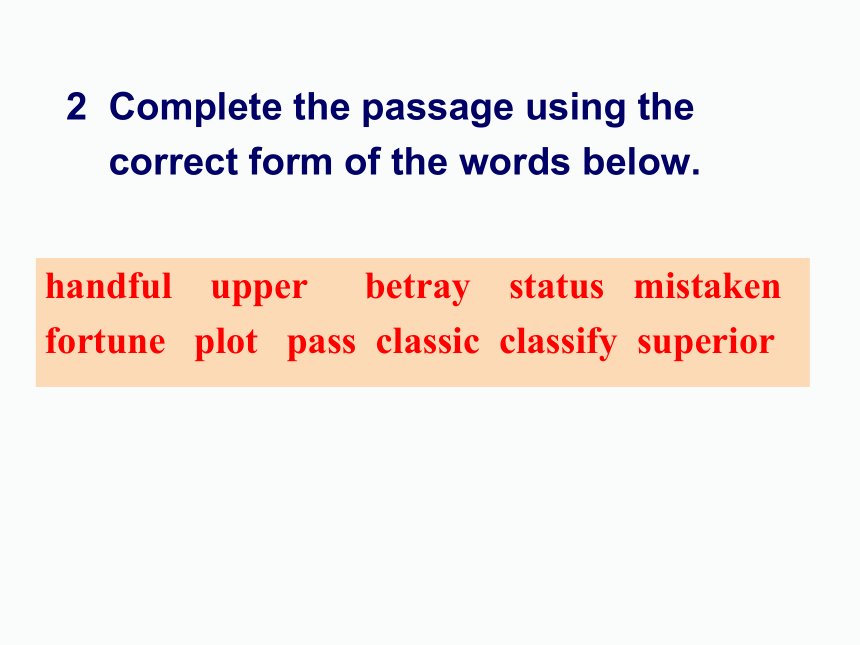
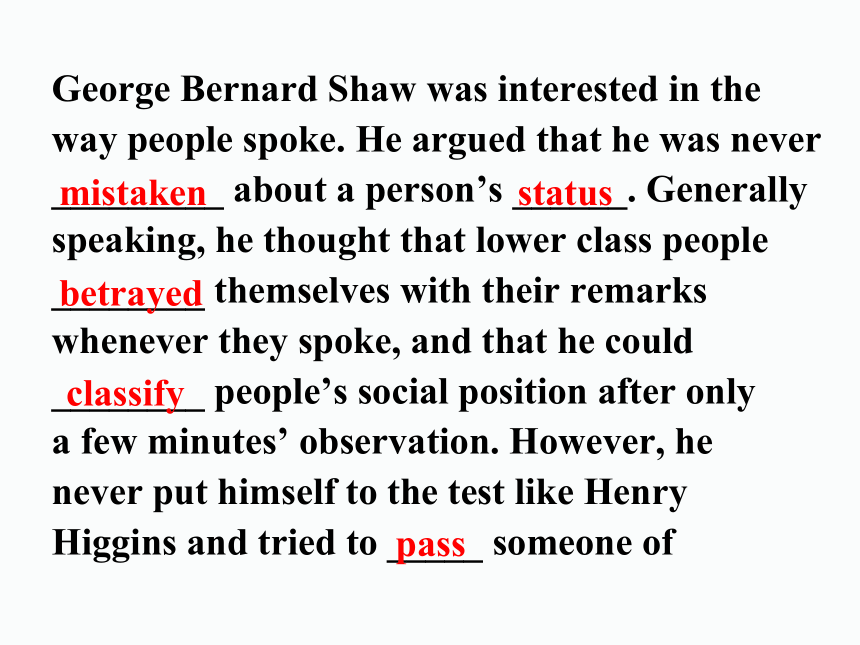
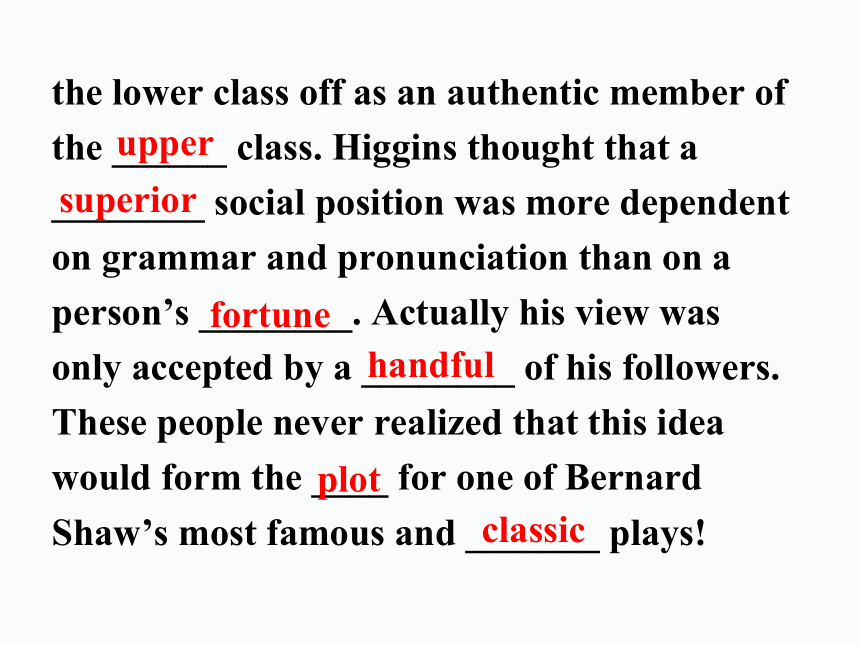
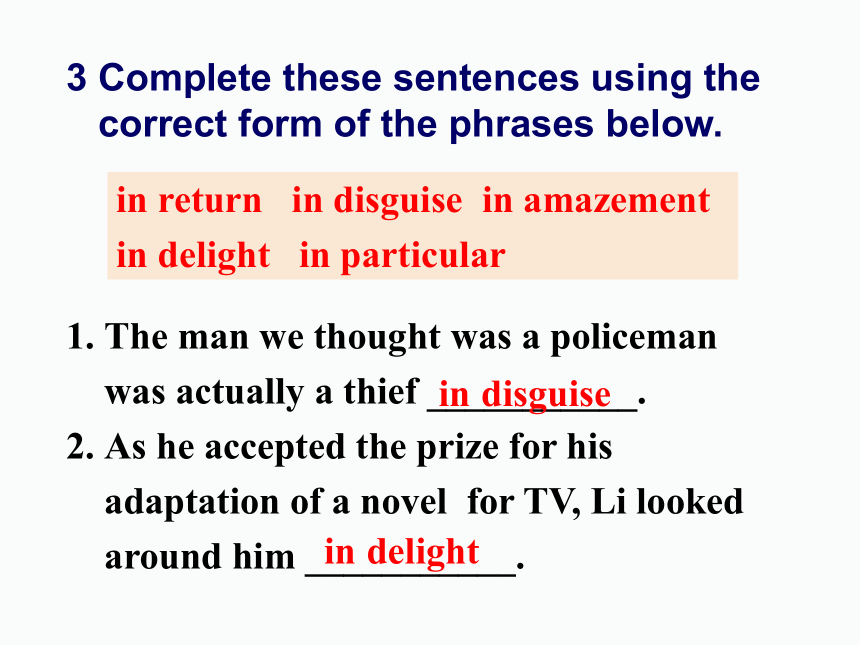
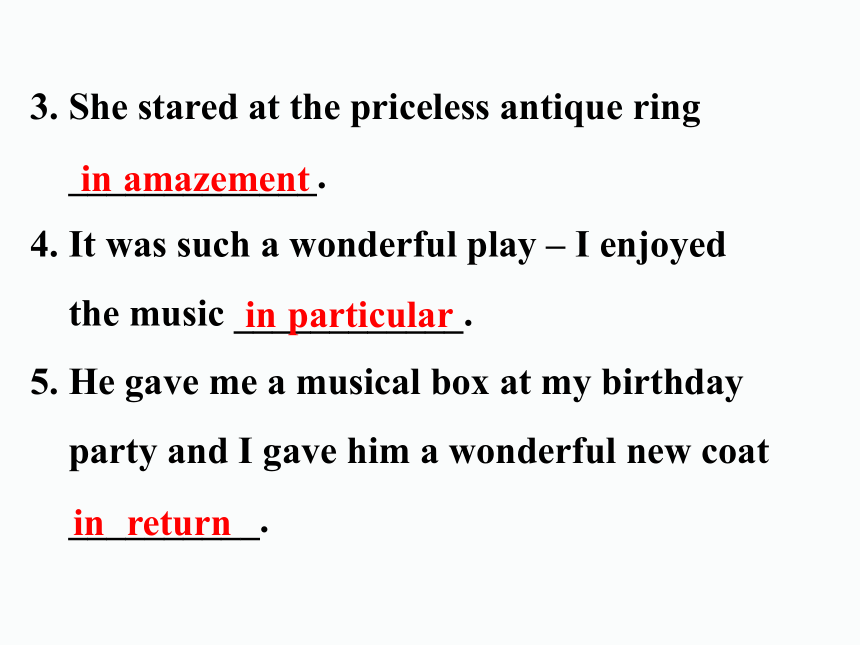
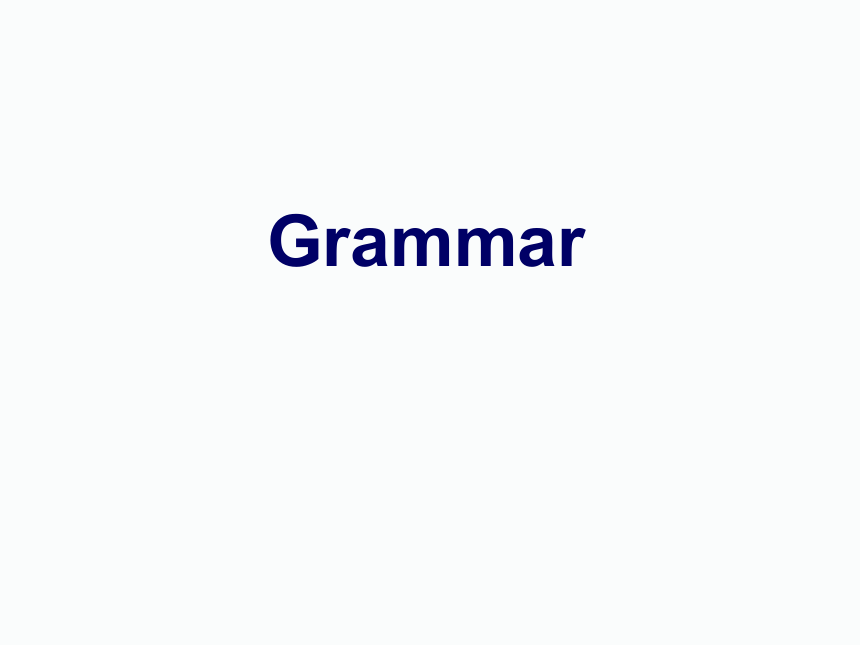
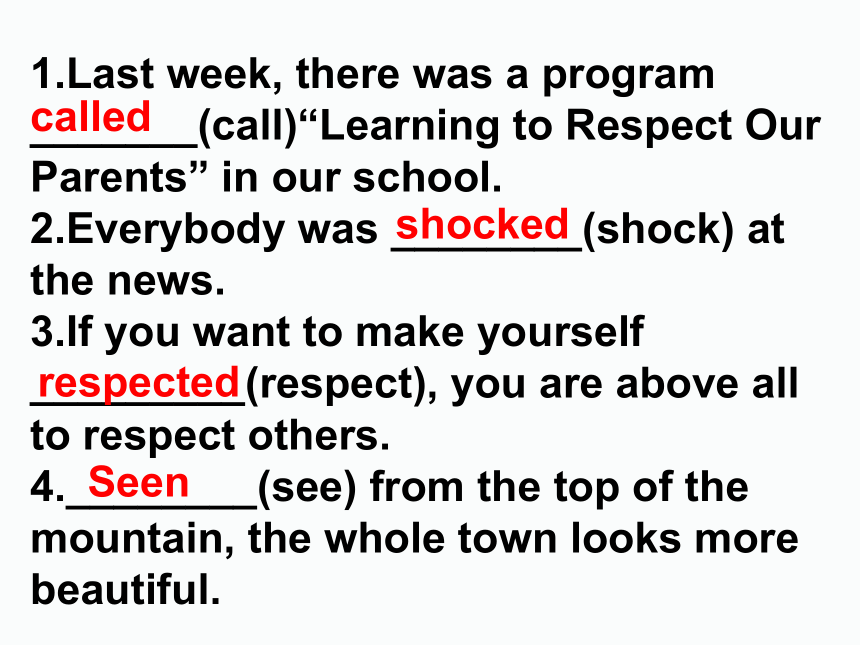
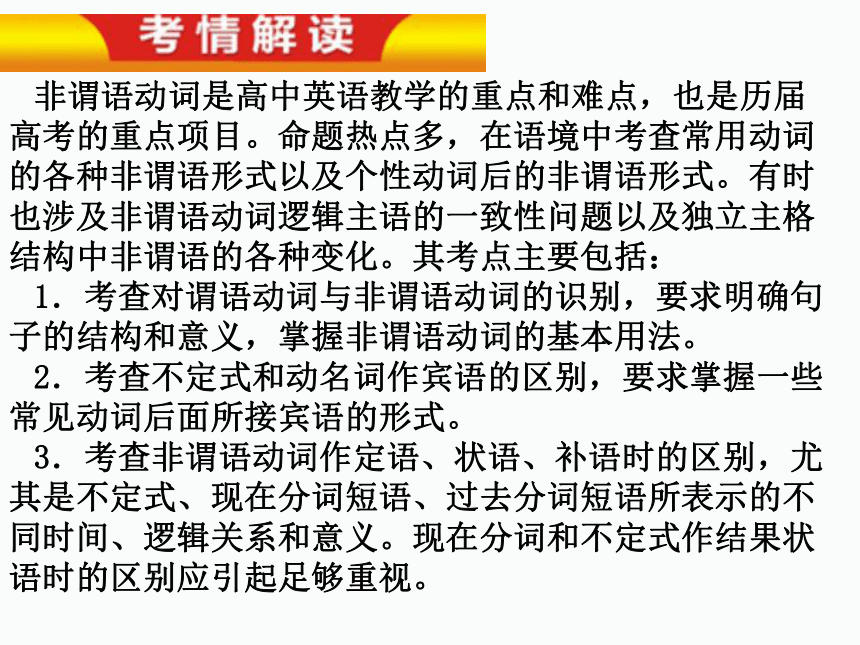
文档简介
课件42张PPT。Unit 4 PygmalionLearning about Language1 Look at the meanings and identify
the words from the unit. Then find
them in the word square. Discovering useful words and expressions 1. words printed above or below a picture
2. a piece of clothing
3. high sound made by blowing air with
your mouth captiongarmentwhistle4. made of wool
5. nervous pause before saying sth.
6. causing problems
7. leather purse
8. final result of sth. woolenhesitatetroublesomewalletoutcome9. strongly disapprove or punish
10. extremely clever or very bright
11. something written in a different form
12. someone who steals sth. or robs sb.condemnbrilliantadaptationthief2 Complete the passage using the
correct form of the words below. handful upper betray status mistaken
fortune plot pass classic classify superior George Bernard Shaw was interested in the
way people spoke. He argued that he was never
_________ about a person’s ______. Generally
speaking, he thought that lower class people
________ themselves with their remarks
whenever they spoke, and that he could
________ people’s social position after only
a few minutes’ observation. However, he
never put himself to the test like Henry
Higgins and tried to _____ someone ofmistakenstatusbetrayedclassifypassthe lower class off as an authentic member of
the ______ class. Higgins thought that a
________ social position was more dependent
on grammar and pronunciation than on a
person’s ________. Actually his view was
only accepted by a ________ of his followers.
These people never realized that this idea
would form the ____ for one of Bernard
Shaw’s most famous and _______ plays! uppersuperiorfortunehandfulclassicplotin return in disguise in amazement
in delight in particular 1. The man we thought was a policeman
was actually a thief ___________.
2. As he accepted the prize for his
adaptation of a novel for TV, Li looked
around him ___________. in disguisein delight3 Complete these sentences using the
correct form of the phrases below.3. She stared at the priceless antique ring
_____________.
4. It was such a wonderful play – I enjoyed
the music ____________.
5. He gave me a musical box at my birthday
party and I gave him a wonderful new coat
__________. in returnin amazementin particular Grammar1.Last week, there was a program _______(call)“Learning to Respect Our Parents” in our school.
2.Everybody was ________(shock) at the news.
3.If you want to make yourself _________(respect), you are above all to respect others.
4.________(see) from the top of the mountain, the whole town looks more beautiful.calledshockedrespectedSeen非谓语动词是高中英语教学的重点和难点,也是历届高考的重点项目。命题热点多,在语境中考查常用动词的各种非谓语形式以及个性动词后的非谓语形式。有时也涉及非谓语动词逻辑主语的一致性问题以及独立主格结构中非谓语的各种变化。其考点主要包括:
1.考查对谓语动词与非谓语动词的识别,要求明确句子的结构和意义,掌握非谓语动词的基本用法。
2.考查不定式和动名词作宾语的区别,要求掌握一些常见动词后面所接宾语的形式。
3.考查非谓语动词作定语、状语、补语时的区别,尤其是不定式、现在分词短语、过去分词短语所表示的不同时间、逻辑关系和意义。现在分词和不定式作结果状语时的区别应引起足够重视。Grammar
The Past Participle
used as the attribute(定语),
predicative(表语),
object complement(宾补)
and adverbial(状语).过去分词作定语往往与被修饰的词靠得很紧,
渐渐地成为一个复合词。这种分词叫分词形容
词 (the Participle Adjective), 实际上相当于
一个单纯的形容词, 除表示“完成”的动作之外,
还表示“被动”的意义。如:一、动词-ed形式作定语 spoken English 英语口语
iced beer 冰冻啤酒
cooked food 熟食 fried chips 炸土豆条但要注意不及物动词的过去分词常表示
“完成”的动作, 而不表示“被动”意义。如:
boiled water (开水); fallen leaves (落叶)
the risen sun (升起的太阳)等。
The tall man is a returned student.
高个子的那个人是个归国留学生。
My parents are both retired teachers.
我的父母都是退休教师。 (1) 前置定语单个的动词-ed形式, 一般放在被修饰
的名词的前面, 作前置定语。The excited people rushed into building.激动的人们冲进大楼。(=the people who were excited)Lost time can never be found again.虚度的时光, 无法挽回。(=time which is lost) e.g. The books left are for my students. (2) 后置定语①少数单个动词的-ed形式, 如left等, 只能
作后置定语。剩下的书是给我的学生的。 ② 动词-ed形式短语作定语时, 通常要放在
被修饰的名词的后面, 在意思上相当于
一个定语从句。Is there anything planned for tonight?(= that has been planned for tonight)今晚有什么活动吗?The meeting, attended by a lot of people,
was a success.这次会议有很多人出席,开得很成功。 (=which was attended by a lot of people) 高考链接Most of the artists ________(invite) to
the party were from South Africa. (MET 90)
2) The first text books _________ (write)
for teaching English as a foreign language
came out in the 16th century. (NMET 94)
invited written 3) Mr. Smith, _______(tire) of the speech, started
to read a ________(bore)novel.
4) Prices of daily foods _________ (buy)through a
computer can be lower than prices in stores.
tired bought boring 过去分词作表语并无“完成”或“被动”
之意, 而是表示主语的状态或思想感情等。
如:
He looked worried after reading the letter.
看完信后,他显得很忧虑。
When we heard of it, we were deeply moved.
当我们听到这件事时,被深深地感动了。
He seemed quite delighted at the idea.
听到这个想法,他似乎很高兴。 二、动词-ed形式作表语 I was very pleased at the news.
听了这消息我很高兴。
He grew much tired of the work.
他十分厌倦这工作。
He seemed quite delighted at the idea.
听了这想法他似乎很高兴。 作表语的-ed形式可被much, very, quite
等所修饰。 Cleaning women in big cities usually
get ______(pay) by the hour.
2) She looked ___________(disappoint) at
the results of the exam.Exercisepaid disappointed 三、动词-ed形式作宾语补足语 能用作宾语补足语的过去分词一般都是
及物动词,表示被动意义或已完成意义,
有时候两者兼而有之。作宾语补足语的
过去分词与宾语有逻辑上的动宾关系,
即宾语是过去分词动作的对象。She found the door broken in when she
came back.
她回来时发现有人破门而人。
My grandfather had his old house rebuilt.
我爷爷找人重修了一下他的旧房子。动词-ed形式作宾语补足语的基本用法
动词的-ed形式可以在“主语+谓语+宾语
+宾语补足语”句型中充当宾语补足语。在
这一结构中, 动词-ed形式和它前面的宾语
构成逻辑上的被动关系。如果这种句子改
为被动语态, 原来的宾语补足语变成了主语
补足语。People found the girl beaten black and blue.人们发现这个女孩被打得青一块紫一块。(宾语补足语)The girl was found beaten black and blue.(主语补足语) (1)动词-ed形式可作表示感觉和心理状态的
动词的宾语补足语,这类动词包括see, hear,
watch, notice, feel, find, think,consider等。We thought the game lost.
我们认为球赛输了。I have never heard him spoken ill of others.
我从未听过有人说他的坏话。
She felt a great weight taken off her mind.
她觉得心里轻松了些。
They considered the matter settled.
他们认为这问题解决了。He got his tooth pulled out yesterday.
他昨天把牙拔了。
He left the classroom, leaving his homework unfinished.
他离开了教室,作业未完成。(2) 动词-ed形式可作使役动词的宾语补足语,
这类动词包括make, get, have, keep, leave, 等。She had her house repaired.
她请人把屋子修好了。
Where did you have your hair cut?
你在哪儿理的发? “have+宾语+done”结构有三个含义:① (请人)把某事做完。He had his hat blown away on his way
home.
在回家的路上他的帽子被吹掉了。
She had her wallet stolen yesterday.
昨天她的钱包被偷了。② 遭遇某种意外情况。I have had all my spelling mistakes
corrected.
我把所有的拼写错误都改正了。
He has had one thousand yuan saved
this year.
他今年已存了1000元。 ③ 完成某事 (自己也可能参与)。(3) 动词-ed形式可作表示希望、要求、
命令等动词的宾语补足语, 这类动词
包括like, want, wish, expect, order等He won’t like such questions discussed at
the meeting.
他不喜欢在会议上讨论这样的问题。
The students wish the soap opera
continued.
学生们希望电视连续剧继续播下去。The thief was brought in with his hands tied
behind his back.小偷被带进来了, 双手被反绑在后面。(4) 过去分词用在“with+宾语+宾补”这一结构中, 过去分词与宾语之间是动宾关系。You can make yourself ___________(understand)
in English pretty well if you keep on speaking the
language.
2. --How do you deal with the disagreement
between the company and the customers?
--The key to solving the problem is to meet the
demand _______(make) by the customers.
Practice understood made 4. English is a language ________(speak) all
around the world and is the working language
of most international organizations.
spoken 5. He found a magazine ________(mark) with the
owner’s name lying on the desk with the
back cover ______ (tear) off.
marked torn 四.过去分词短语做状语
可表示时间、地点、原因、条件、让步、伴随等
意义。相当于一个时间、地点、原因、条件、
让步等状语从句, 若过去分词作状语, 句子的主语
与分词所表示的动作构成动宾关系, 即是该分词
动作的承受者。
过去分词(短语)作状语时, 也可在其前面加上
连词 when, if, once, though, unless等, 以便明确
作何种状语。1. Can those ____ at the back of the
classroom hear me? (福建卷)
A. seat B. sit C. seated D. sat
2. The trees ____ in the storm have been
moved off the road. (湖南卷)
A. being blown down B. blown down
C. blowing down D. to blow down高考链接C B 3. To learn English well, we should find
opportunities to hear English ______ as
much as we can. (江苏卷)
A. speak. B. speaking
C. spoken D. to speak
4. We finished the run in less than half the
time _____. (江西卷)
A. allowing B. to allow
C. allowed D. allowsC C 5. It is one of the funniest things ____ on the
Internet so far this year. (浙江卷)
A. finding B. being found
C. to find D. foundD 7. ____ in 1636, Harvard is one of the most famous universities in the United States.
A. Being founded?? B. It was founded
C. Founded???? D. FoundingC Finish the exercises on grammar in
this unit.
2. Preview the reading materials in
Using Language.Homework
the words from the unit. Then find
them in the word square. Discovering useful words and expressions 1. words printed above or below a picture
2. a piece of clothing
3. high sound made by blowing air with
your mouth captiongarmentwhistle4. made of wool
5. nervous pause before saying sth.
6. causing problems
7. leather purse
8. final result of sth. woolenhesitatetroublesomewalletoutcome9. strongly disapprove or punish
10. extremely clever or very bright
11. something written in a different form
12. someone who steals sth. or robs sb.condemnbrilliantadaptationthief2 Complete the passage using the
correct form of the words below. handful upper betray status mistaken
fortune plot pass classic classify superior George Bernard Shaw was interested in the
way people spoke. He argued that he was never
_________ about a person’s ______. Generally
speaking, he thought that lower class people
________ themselves with their remarks
whenever they spoke, and that he could
________ people’s social position after only
a few minutes’ observation. However, he
never put himself to the test like Henry
Higgins and tried to _____ someone ofmistakenstatusbetrayedclassifypassthe lower class off as an authentic member of
the ______ class. Higgins thought that a
________ social position was more dependent
on grammar and pronunciation than on a
person’s ________. Actually his view was
only accepted by a ________ of his followers.
These people never realized that this idea
would form the ____ for one of Bernard
Shaw’s most famous and _______ plays! uppersuperiorfortunehandfulclassicplotin return in disguise in amazement
in delight in particular 1. The man we thought was a policeman
was actually a thief ___________.
2. As he accepted the prize for his
adaptation of a novel for TV, Li looked
around him ___________. in disguisein delight3 Complete these sentences using the
correct form of the phrases below.3. She stared at the priceless antique ring
_____________.
4. It was such a wonderful play – I enjoyed
the music ____________.
5. He gave me a musical box at my birthday
party and I gave him a wonderful new coat
__________. in returnin amazementin particular Grammar1.Last week, there was a program _______(call)“Learning to Respect Our Parents” in our school.
2.Everybody was ________(shock) at the news.
3.If you want to make yourself _________(respect), you are above all to respect others.
4.________(see) from the top of the mountain, the whole town looks more beautiful.calledshockedrespectedSeen非谓语动词是高中英语教学的重点和难点,也是历届高考的重点项目。命题热点多,在语境中考查常用动词的各种非谓语形式以及个性动词后的非谓语形式。有时也涉及非谓语动词逻辑主语的一致性问题以及独立主格结构中非谓语的各种变化。其考点主要包括:
1.考查对谓语动词与非谓语动词的识别,要求明确句子的结构和意义,掌握非谓语动词的基本用法。
2.考查不定式和动名词作宾语的区别,要求掌握一些常见动词后面所接宾语的形式。
3.考查非谓语动词作定语、状语、补语时的区别,尤其是不定式、现在分词短语、过去分词短语所表示的不同时间、逻辑关系和意义。现在分词和不定式作结果状语时的区别应引起足够重视。Grammar
The Past Participle
used as the attribute(定语),
predicative(表语),
object complement(宾补)
and adverbial(状语).过去分词作定语往往与被修饰的词靠得很紧,
渐渐地成为一个复合词。这种分词叫分词形容
词 (the Participle Adjective), 实际上相当于
一个单纯的形容词, 除表示“完成”的动作之外,
还表示“被动”的意义。如:一、动词-ed形式作定语 spoken English 英语口语
iced beer 冰冻啤酒
cooked food 熟食 fried chips 炸土豆条但要注意不及物动词的过去分词常表示
“完成”的动作, 而不表示“被动”意义。如:
boiled water (开水); fallen leaves (落叶)
the risen sun (升起的太阳)等。
The tall man is a returned student.
高个子的那个人是个归国留学生。
My parents are both retired teachers.
我的父母都是退休教师。 (1) 前置定语单个的动词-ed形式, 一般放在被修饰
的名词的前面, 作前置定语。The excited people rushed into building.激动的人们冲进大楼。(=the people who were excited)Lost time can never be found again.虚度的时光, 无法挽回。(=time which is lost) e.g. The books left are for my students. (2) 后置定语①少数单个动词的-ed形式, 如left等, 只能
作后置定语。剩下的书是给我的学生的。 ② 动词-ed形式短语作定语时, 通常要放在
被修饰的名词的后面, 在意思上相当于
一个定语从句。Is there anything planned for tonight?(= that has been planned for tonight)今晚有什么活动吗?The meeting, attended by a lot of people,
was a success.这次会议有很多人出席,开得很成功。 (=which was attended by a lot of people) 高考链接Most of the artists ________(invite) to
the party were from South Africa. (MET 90)
2) The first text books _________ (write)
for teaching English as a foreign language
came out in the 16th century. (NMET 94)
invited written 3) Mr. Smith, _______(tire) of the speech, started
to read a ________(bore)novel.
4) Prices of daily foods _________ (buy)through a
computer can be lower than prices in stores.
tired bought boring 过去分词作表语并无“完成”或“被动”
之意, 而是表示主语的状态或思想感情等。
如:
He looked worried after reading the letter.
看完信后,他显得很忧虑。
When we heard of it, we were deeply moved.
当我们听到这件事时,被深深地感动了。
He seemed quite delighted at the idea.
听到这个想法,他似乎很高兴。 二、动词-ed形式作表语 I was very pleased at the news.
听了这消息我很高兴。
He grew much tired of the work.
他十分厌倦这工作。
He seemed quite delighted at the idea.
听了这想法他似乎很高兴。 作表语的-ed形式可被much, very, quite
等所修饰。 Cleaning women in big cities usually
get ______(pay) by the hour.
2) She looked ___________(disappoint) at
the results of the exam.Exercisepaid disappointed 三、动词-ed形式作宾语补足语 能用作宾语补足语的过去分词一般都是
及物动词,表示被动意义或已完成意义,
有时候两者兼而有之。作宾语补足语的
过去分词与宾语有逻辑上的动宾关系,
即宾语是过去分词动作的对象。She found the door broken in when she
came back.
她回来时发现有人破门而人。
My grandfather had his old house rebuilt.
我爷爷找人重修了一下他的旧房子。动词-ed形式作宾语补足语的基本用法
动词的-ed形式可以在“主语+谓语+宾语
+宾语补足语”句型中充当宾语补足语。在
这一结构中, 动词-ed形式和它前面的宾语
构成逻辑上的被动关系。如果这种句子改
为被动语态, 原来的宾语补足语变成了主语
补足语。People found the girl beaten black and blue.人们发现这个女孩被打得青一块紫一块。(宾语补足语)The girl was found beaten black and blue.(主语补足语) (1)动词-ed形式可作表示感觉和心理状态的
动词的宾语补足语,这类动词包括see, hear,
watch, notice, feel, find, think,consider等。We thought the game lost.
我们认为球赛输了。I have never heard him spoken ill of others.
我从未听过有人说他的坏话。
She felt a great weight taken off her mind.
她觉得心里轻松了些。
They considered the matter settled.
他们认为这问题解决了。He got his tooth pulled out yesterday.
他昨天把牙拔了。
He left the classroom, leaving his homework unfinished.
他离开了教室,作业未完成。(2) 动词-ed形式可作使役动词的宾语补足语,
这类动词包括make, get, have, keep, leave, 等。She had her house repaired.
她请人把屋子修好了。
Where did you have your hair cut?
你在哪儿理的发? “have+宾语+done”结构有三个含义:① (请人)把某事做完。He had his hat blown away on his way
home.
在回家的路上他的帽子被吹掉了。
She had her wallet stolen yesterday.
昨天她的钱包被偷了。② 遭遇某种意外情况。I have had all my spelling mistakes
corrected.
我把所有的拼写错误都改正了。
He has had one thousand yuan saved
this year.
他今年已存了1000元。 ③ 完成某事 (自己也可能参与)。(3) 动词-ed形式可作表示希望、要求、
命令等动词的宾语补足语, 这类动词
包括like, want, wish, expect, order等He won’t like such questions discussed at
the meeting.
他不喜欢在会议上讨论这样的问题。
The students wish the soap opera
continued.
学生们希望电视连续剧继续播下去。The thief was brought in with his hands tied
behind his back.小偷被带进来了, 双手被反绑在后面。(4) 过去分词用在“with+宾语+宾补”这一结构中, 过去分词与宾语之间是动宾关系。You can make yourself ___________(understand)
in English pretty well if you keep on speaking the
language.
2. --How do you deal with the disagreement
between the company and the customers?
--The key to solving the problem is to meet the
demand _______(make) by the customers.
Practice understood made 4. English is a language ________(speak) all
around the world and is the working language
of most international organizations.
spoken 5. He found a magazine ________(mark) with the
owner’s name lying on the desk with the
back cover ______ (tear) off.
marked torn 四.过去分词短语做状语
可表示时间、地点、原因、条件、让步、伴随等
意义。相当于一个时间、地点、原因、条件、
让步等状语从句, 若过去分词作状语, 句子的主语
与分词所表示的动作构成动宾关系, 即是该分词
动作的承受者。
过去分词(短语)作状语时, 也可在其前面加上
连词 when, if, once, though, unless等, 以便明确
作何种状语。1. Can those ____ at the back of the
classroom hear me? (福建卷)
A. seat B. sit C. seated D. sat
2. The trees ____ in the storm have been
moved off the road. (湖南卷)
A. being blown down B. blown down
C. blowing down D. to blow down高考链接C B 3. To learn English well, we should find
opportunities to hear English ______ as
much as we can. (江苏卷)
A. speak. B. speaking
C. spoken D. to speak
4. We finished the run in less than half the
time _____. (江西卷)
A. allowing B. to allow
C. allowed D. allowsC C 5. It is one of the funniest things ____ on the
Internet so far this year. (浙江卷)
A. finding B. being found
C. to find D. foundD 7. ____ in 1636, Harvard is one of the most famous universities in the United States.
A. Being founded?? B. It was founded
C. Founded???? D. FoundingC Finish the exercises on grammar in
this unit.
2. Preview the reading materials in
Using Language.Homework
